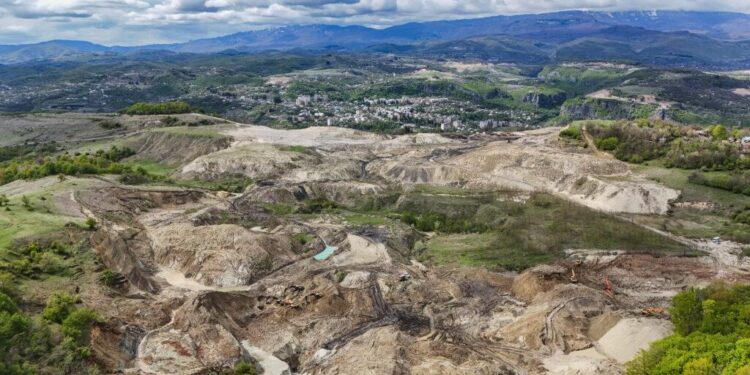Deep beneath the rugged landscapes of Georgia lies a mineral deposit sparking intense international debate and geopolitical maneuvering. As Europe accelerates its transition to green energy and advanced technologies, the demand for critical metals has ignited a new industrial arms race-centered on a controversial mine whose development has drawn scrutiny over environmental concerns, local opposition, and strategic rivalries. This article explores how the Georgian mine has become a focal point in Europe’s quest for resource security, highlighting the complex interplay of economic ambition and political tension shaping the continent’s industrial future.
Contested Resources and Geopolitical Tensions Shaping Europe’s Industrial Strategy
Europe’s race to secure critical raw materials has intensified geopolitical rivalries, with the contested Madneuli mine in Georgia emerging as a strategic flashpoint. Rich in copper and gold, this dormant site is attracting renewed interest amid soaring demand for components fundamental to the continent’s green energy transition and defense modernization. The mine’s ownership and environmental legacy have sparked friction between European investors eager to diversify supply chains and local authorities guarding sovereign interests, highlighting the delicate balance between industrial ambition and regional stability.
The mine’s position at a strategic crossroads has also drawn attention from competing global powers, each seeking influence in the South Caucasus. Key concerns revolve around resource access, transport corridors, and geopolitical leverage. Stakeholders have raised issues related to:
- Environmental standards and remediation of toxic tailings;
- Land rights involving local communities;
- Foreign investment controls amid rising nationalism.
These complexities underscore how resource competition is reshaping not only economic policy but also alliance-building within and beyond Europe, making the Georgian mine a potent symbol of the broader industrial and strategic recalibrations underway.
| Resource | European Demand Growth (2020-2030) | Geopolitical Concerns |
|---|---|---|
| Copper | +75% | Supply chain diversification |
| Gold | +20% | Foreign investment risks |
| Rare Earth Elements | +150% | Access control & transport routes |
Environmental and Social Impacts of the Georgian Mine Under Scrutiny
The development of the Georgian mine has sparked intense debate among environmentalists and human rights advocates alike, as concerns over its far-reaching consequences come to light. The extraction process jeopardizes fragile ecosystems, threatening local biodiversity with irreversible damage. Additionally, the disruption to water sources raises alarms, with critics warning that contamination could affect not only the immediate region but also downstream communities. The mine’s expansion plans, proponents argue, are central to Europe’s drive toward securing critical raw materials for burgeoning industrial capacities, but opponents highlight the unchecked environmental costs often sidelined in pursuit of geopolitical and economic ambitions.
Social implications surrounding the project are equally contentious. While the mine promises job creation and infrastructure investment in rural areas, many local residents have expressed fears of displacement and loss of traditional livelihoods. Reports of inadequate consultation and limited transparency have fueled grassroots activism, demanding stronger safeguards and fair compensation. The situation highlights a broader conflict between national strategic interests and the rights of indigenous and local populations, raising questions about sustainable development practices within the European supply chain for strategic minerals.
- Environmental Risks: Habitat destruction, water contamination, soil erosion
- Social Concerns: Displacement, cultural erosion, lack of community engagement
- Economic Factors: Job creation, investment inflows, geopolitical leverage
| Impact Category | Potential Outcome |
|---|---|
| Water Resources | Pollution & Scarcity |
| Biodiversity | Loss of Endangered Species |
| Community Welfare | Economic Uplift vs. Social Disruption |
Policy Recommendations for Sustainable and Transparent Resource Management in Europe
To mitigate the geopolitical and environmental risks linked to the Georgian mining project, European policymakers must prioritize stringent regulations that promote transparency and accountability throughout the entire resource supply chain. Implementing mandatory due diligence frameworks for companies engaged in mineral extraction and processing will ensure that stakeholders maintain rigorous environmental and social governance (ESG) standards. Furthermore, establishing independent auditing bodies with cross-border jurisdiction could help enforce compliance and deter opaque practices fueling the growing industrial arms race.
In addition to regulatory oversight, diversifying supply sources and investing in alternative materials could reduce Europe’s dependency on controversial mining operations. Strategic partnerships geared toward sustainable innovation in recycling and circular economy models are essential. Policymakers should also champion community engagement programs that empower local populations affected by mining activities, thereby aligning economic interests with human rights protection.
- Mandatory ESG reporting for resource extraction companies
- Creation of EU-wide independent audit authorities
- Investment in recycling technologies and circular economy initiatives
- Establishment of community liaison committees to oversee mining impact
- Promotion of material substitution in critical industries
| Policy Measure | Expected Impact | Timeframe | |
|---|---|---|---|
| Enforce ESG compliance | Reduced environmental damage | Short to Medium Term | |
| Policy Measure | Expected Impact | Timeframe | |
| Enforce ESG compliance | Reduced environmental damage | Short to Medium Term | |
| Establish EU-wide independent audit authorities | Improved accountability and transparency | Medium Term | |
| Investment in recycling technologies and circular economy initiatives | Decreased reliance on mining, resource efficiency | Medium to Long Term | |
| Establishment of community liaison committees | Enhanced local engagement and social license to operate | Short Term | |
| Promotion of material substitution in critical industries | Wrapping Up As Europe accelerates its pursuit of strategic minerals to power the next generation of technology and defense industries, the contested Georgian mine stands as a stark reminder of the complex interplay between economic ambition, political influence, and environmental concerns. The unfolding debate underscores the challenges facing European policymakers as they navigate competing interests in securing critical resources while addressing the social and ecological costs. How this industrial arms race evolves will not only shape the continent’s technological future but also test the resilience of its commitment to transparency and sustainable development. ADVERTISEMENT |
















